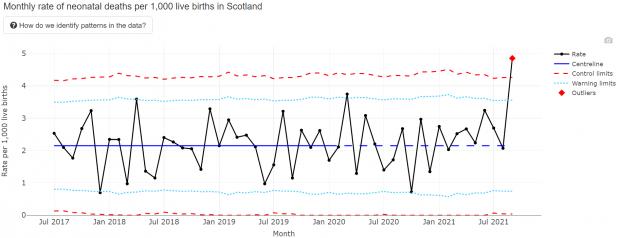Healthcare Improvement Scotland (HIS) confirmed that it has appointed retired consultant neonatologist Dr Helen Mactier to chair the expert group which will investigate the possible causes behind two unexplained spikes in neonatal mortality just six months apart, in September 2021 and March 2022, when a total of 39 infants died.
Public Health Scotland
Browse the articles related to this topic below.
Join our community on Guilded.
PUBLIC health experts ruled out any link between spikes in neonatal deaths and the Covid vaccine without checking whether any of the infants’ mothers had received the jag during pregnancy.
DOUBLE-JABBED Scots are now more likely to be admitted to hospital with Covid than the unvaccinated amid an increase in elderly people falling ill due to waning immunity.
It comes amid “weird” data showing that case rates have been lower in unvaccinated individuals than the single, double, or even triple-jabbed since Omicron became the dominant variant in Scotland.
The counterintuitive data from Public Health Scotland (PHS) contradicts previous pandemic trends which have consistently shown infection, hospitalisation and death rates to be highest among the unvaccinated.
An investigation has been launched into a spike in deaths among newborn babies in Scotland.
Official figures reveal that 21 infants died during September within 28 days of birth, causing the neonatal mortality rate to breach an upper warning threshold known as the ‘control limit’ for the first time in at least four years.
Control and warning limits are designed to flag up to public health teams when neonatal, stillbirth or other infant deaths are occurring at unexpectedly high or low levels which may not be due to chance.
Concerns have previously been raised about the potential impact of Covid on maternity services and maternal wellbeing, but it is the first time since the pandemic began that neonatal deaths have been so abnormally above average.
Although the rate fluctuates month to month, the figure for September – at 4.9 per 1000 live births – is on a par with levels that were last typically seen in the late 1980s.

The cost of adding one more year of life to someone who is dying of coronavirus is more than five times higher than the maximum the NHS can spend on other illnesses, according to a statistician.
- The cost of adding one more year of life to someone who is dying of coronavirus is more than five times higher than the maximum the NHS can spend on other illnesses.
- Professor Simon Wood has calculated that it costs approximately £180,000 per extra year of life to rescue a dying Covid-19 patient.
- NHS watchdog will only spend up to £30,000 per year of life on any new treatment, deeming any higher cost a bad cost-to-benefit ratio.
- Many people left in worse physical or mental health, or in poverty, as a result of policies brought in to slow down Covid-19 could see years chopped off their life expectancy.
- The Office for Budget Responsibility predicted the UK’s national debt would grow by £550billion next year as a result of spending during the epidemic.
- The National Institute for Health and Care Excellence (NICE), which makes decisions on which drugs are good value for the NHS, considers £30,000 to be at the upper end of its good value limit.
- Statistical organisations across the UK, meanwhile, suggest that there have been around 59,000 ‘excess deaths’ during the epidemic, which includes people who died of Covid-19 but never tested positive, as well as those who died because of indirect effects of lockdown, such as being unable to get hospital care.
https://www.dailymail.co.uk/news/article-8795383/How-year-life-saved-Covid-19-costs-180-000.html